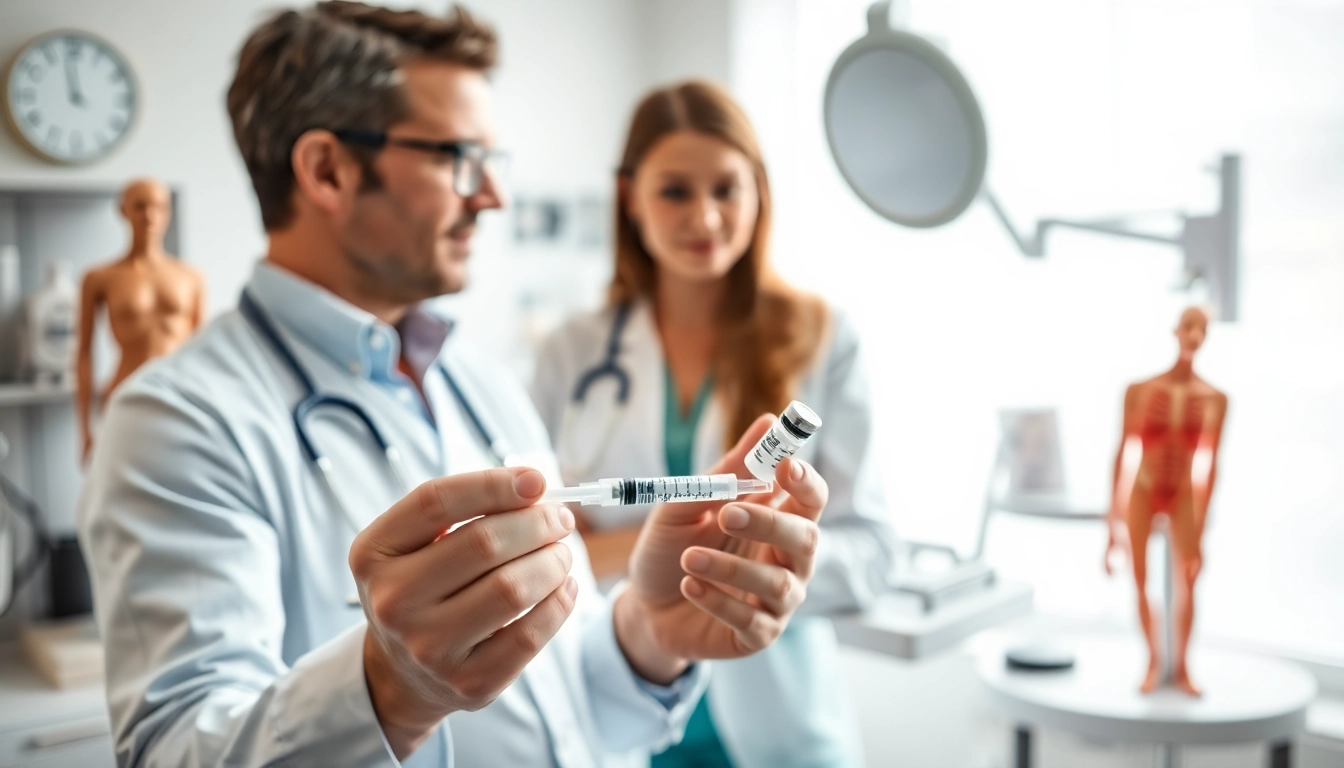The Advantages and Insights of Peptide Therapy for Enhanced Wellness
Understanding Peptide Therapy
What Is Peptide Therapy?
Peptide therapy is a groundbreaking medical treatment that focuses on using small chains of amino acids, known as peptides, to enhance the natural biochemical processes in the body. These sequences of amino acids serve various functions, including hormone regulation, cellular signaling, and overall metabolic improvement. By mimicking the body’s natural processes, peptide therapy aims to restore health, improve well-being, and provide targeted treatments for various health conditions.
Essentially, peptides are vital components of proteins and play a significant role in numerous bodily functions. In peptide therapy, specific peptides are selected based on their biological roles, ultimately leading to improved physiological responses. This approach is increasingly recognized for its potential in anti-aging therapies, muscle growth, weight management, and healing chronic conditions. Peptide Therapy employs these natural compounds to optimize health outcomes and promote wellness beyond conventional medicine.
How Does Peptide Therapy Work?
The mechanism of peptide therapy revolves around the body’s response to peptides. When administered, peptides interact with receptors on cells, triggering specific biological responses. This interaction can lead to the stimulation of hormone production, enhanced muscle repair, or boosted fat metabolism, depending on the peptide used. The tailored nature of peptide therapy allows for targeted treatment, addressing individual health concerns with precision.
Peptide therapy can be delivered through various methods, including injections, nasal sprays, or topical applications. Injection is the most common method, as it allows for quicker and targeted absorption directly into the bloodstream. Once introduced, the peptides circulate through the body, binding with cell receptors and initiating desired physiological changes.
Benefits of Peptide Therapy
The benefits of peptide therapy extend across numerous health domains. Some of the primary advantages include:
- Enhanced Muscle Growth: Certain peptides, such as growth hormone-releasing peptides, promote muscle growth and recovery by stimulating the release of growth hormone.
- Improved Metabolism: Peptides can aid in metabolic regulation, helping individuals achieve and maintain a healthy weight.
- Anti-Aging Effects: Some peptides are designed to enhance skin elasticity, promote collagen production, and reduce wrinkles, contributing to an overall youthful appearance.
- Reduced Inflammation: Peptides are known for their anti-inflammatory properties, which can be beneficial in treating chronic pain and inflammatory conditions.
- Enhanced Recovery: Many athletes utilize peptide therapy to expedite recovery from injuries and improve performance, as peptides can promote tissue and muscle repair.
Types of Peptides Used in Therapy
Popular Peptide Therapy Options
There are several types of peptides utilized in therapy, each designed to target specific health concerns. Some of the most popular peptides include:
- Growth Hormone-Releasing Peptides (GHRPs): These stimulate the body’s own production of growth hormone, which is essential for growth, cell repair, and metabolism.
- CJC-1295: Often used in conjunction with GHRPs, this peptide helps maintain elevated growth hormone levels, promoting muscle gain and fat loss.
- BPC-157: Known for its healing properties, this peptide is often used for sports injuries, reducing inflammation and accelerating recovery.
- Melanotan II: This peptide is used for skin tanning and may have benefits for libido enhancement.
- Thymosin Beta-4: A peptide that plays a crucial role in tissue repair and regeneration, making it beneficial for recovery from injuries.
Mechanisms of Action
Understanding how peptides work is vital for optimizing their therapeutic effects. Each peptide has a unique mechanism of action which dictates its effectiveness:
- Cell Signaling: Many peptides act as signaling molecules, which means they bind to specific receptors on cells to initiate a biological response.
- Hormone Regulation: Certain peptides can enhance or inhibit hormone production, leading to improved hormonal balance.
- Cell Proliferation: Some peptides promote cell growth and regeneration, aiding in tissue healing and repair.
- Immune Modulation: Peptides like Thymosin Beta-4 can modulate immune responses, making them useful for treating autoimmune conditions.
Safety and Efficacy of Peptide Therapy
Safety is a crucial consideration in any therapeutic approach, and peptide therapy is no exception. While peptides are generally considered safe when administered properly, certain factors may influence their safety:
- Quality of Product: The efficacy and safety of peptide therapy largely depend on the quality of the peptides used. It’s essential to source peptides from reputable suppliers.
- Dosage: Administering the correct dosage is vital to minimize potential side effects and maximize benefits.
- Health Conditions: Pre-existing health conditions may affect how the body responds to peptide therapy, making it necessary to consult health professionals before starting treatment.
Applications of Peptide Therapy
Peptide Therapy for Anti-Aging
Peptide therapy has gained significant attention in the anti-aging arena. As we age, our natural peptide levels decline, which can lead to various age-related issues, including decreased muscle mass, increased body fat, and diminished skin elasticity. Peptides such as CJC-1295 and Ipamorelin stimulate growth hormone production, promoting rejuvenation and vitality. These peptides can enhance skin health, improve energy levels, and support overall age reversal by stimulating collagen production and enhancing cellular turnover.
Peptide Therapy for Weight Loss
Weight management is a common health goal, and peptide therapy offers promising solutions for those struggling with weight loss. Peptides like Melanotan II and AOD9604 are designed to target fat metabolism, facilitating the body’s ability to burn fat while preserving lean muscle mass. By enhancing metabolic processes and regulating hunger hormones, peptide therapy can provide a comprehensive approach to effective weight management, particularly when combined with diet and exercise.
Peptide Therapy for Muscle Growth
Athletes and fitness enthusiasts often seek peptide therapy to enhance muscle growth and performance. Peptides such as GHRPs enhance the body’s production of growth hormone, facilitating increased muscle synthesis and recovery. This mechanism not only supports faster healing after strenuous workouts or injuries but can also lead to improved athletic performance over time. Regular use of these peptides, under medical supervision, can result in measurable gains in strength and physique.
Beginning Your Journey with Peptide Therapy
Consultation and Preparation
Before embarking on a peptide therapy regimen, it’s critical to consult with a qualified healthcare professional who understands the complexities of peptide therapy. The consultation typically includes a comprehensive health assessment, discussing any existing medical conditions, medications, and health goals. This personalized evaluation ensures the suitability of peptide therapy for individual needs and helps establish an effective treatment plan.
What to Expect During Treatment
During the administration of peptide therapy, patients can expect a straightforward procedure, often involving injections or other delivery methods. Depending on the type of peptide and treatment goals, sessions may vary in frequency. Monitoring during treatment is essential; thus, regular follow-ups with healthcare providers are recommended to assess progress, adjust dosages if necessary, and manage any potential side effects.
Aftercare and Follow-Up
Following peptide therapy, aftercare is crucial for maximizing benefits and ensuring safety. Patients should adhere to any post-treatment guidelines provided by their healthcare provider, which may include lifestyle recommendations, follow-up appointments, and monitoring for any adverse reactions. Regular follow-ups will also help to track progress, enabling the healthcare provider to make timely adjustments to the treatment plan.
Addressing Common Concerns about Peptide Therapy
Potential Side Effects of Peptide Therapy
While peptide therapy is generally safe, there can be potential side effects, which may include:
- Injection Site Reactions: Minor pain, redness, or swelling at the injection site.
- Headaches: Some individuals report headaches during treatment, which are typically mild and temporary.
- Nausea: Mild gastrointestinal upset can occur as the body adjusts to the new peptides.
- Hormonal Imbalances: Overuse of peptides may lead to hormonal fluctuations, emphasizing the importance of proper dosing.
Is Peptide Therapy FDA-Approved?
Peptide therapy has garnered attention for its health benefits; however, the regulatory status of many peptides varies. While some peptides have received FDA approval for specific uses, many other peptides utilized in therapy fall under the category of investigational drugs and are not FDA-approved. Therefore, it’s essential to consult with healthcare professionals who are knowledgeable about the current regulatory landscape surrounding peptide therapy.
Can Peptide Therapy Fit into Your Lifestyle?
Incorporating peptide therapy into one’s lifestyle can be seamless and effective, provided it aligns with individual health goals and daily routines. Patients can manage treatment schedules around their existing commitments, making it a flexible option for enhancing health and wellness. Moreover, combining peptide therapy with a healthy diet, regular exercise, and adequate rest can amplify its benefits, promoting holistic well-being.














Post Comment